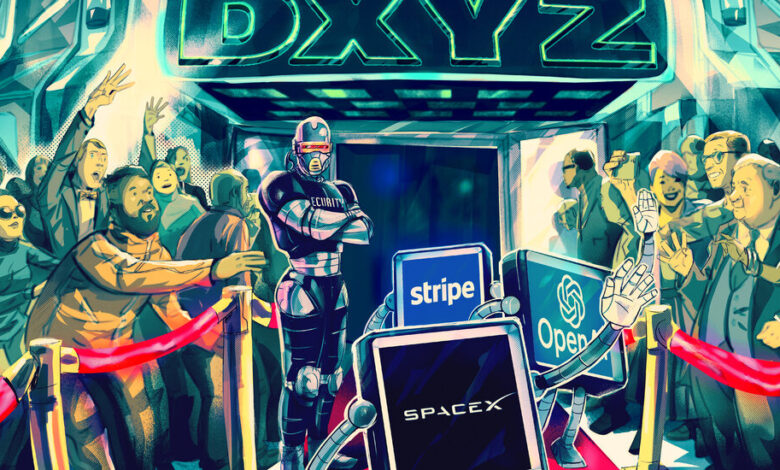Tensions Rise in Silicon Valley Over Sales of Start-Up Stocks

Sohail Prasad, an entrepreneur, launched a fund in March called the Destiny Tech100. The fund owns shares in hot tech start-ups like the payments firm Stripe, the rocket maker SpaceX and the artificial intelligence company OpenAI.
Few people get the chance to invest in these privately held companies since their shares are not openly traded. Mr. Prasad’s intention with Destiny was to let the rest of the world get a piece of them through his fund.
But soon after Destiny debuted, two tech start-ups — Stripe and Plaid, a banking service — said the fund did not legally own their shares. A competitor criticized Destiny as “too good to be true.” Robinhood, the stock trading app, stopped letting investors buy into the fund, saying it had been added to its app by mistake.
Mr. Prasad was not surprised by the uproar. It was a sign of “a true cultural movement in which DXYZ is at the forefront,” he said, referring to Destiny by its ticker symbol.
Tensions over the shadowy and often enigmatic market of private company stocks have reached a boiling point, just as the buying and selling of such shares has grown bigger than ever. At its center is an age-old debate: Should everyone have access to the riches and risks of investing in Silicon Valley start-ups?
The market for private company stocks, also known as the secondary market, is on track to hit a record $64 billion this year, up 40 percent from last year, according to Sacra, a research firm focused on private investments. A decade ago, the private company stock market was roughly $16 billion, according to Industry Ventures, a firm focused on secondary transactions.
As the appetite for private company shares has soared, so have the headaches. If a company is publicly traded, like Apple or Amazon, anyone can easily buy and sell its stock. But privately owned tech start-ups like Stripe typically have a small circle of owners, such as their founders and employees, as well as the wealthy individuals and venture capital firms that provided financing for the companies to grow. The companies’ stocks do not usually change hands.
Now, as these start-ups mature and don’t appear to be in a rush to go public, a wider range of investors are becoming eager to own their stock. New online marketplaces that match sellers of start-up stock with interested buyers have sprung up.
And funds like Destiny have appeared. Destiny is among the only options for retail investors, since most other funds and marketplaces are restricted to “accredited” investors with high incomes or net worth.
The activity has increasingly rattled some start-ups, which have long resisted letting their shares freely change hands. The more people who own their stock, the more unwieldy the number of shareholders, which can lead to difficulties complying with securities laws, among other complications. While some start-ups are allowing some trading of their stock, other trades are happening without permission.
“We’re coming to a point where something has to give,” said Noel Moldvai, the chief executive of Augment, a marketplace for private start-up shares.
‘Hey, I Own Some SpaceX’
Among the online marketplaces for buying and selling private company stocks is Hiive, which started in 2022. It is currently offering customers shares in Anthropic, a hot artificial intelligence start-up.
Hiive bought $50 million of Anthropic stock and is letting investors buy chunks as small as $25,000, said Sim Desai, the company’s chief executive. The site oversees an average of around $20 million in deals a week.
At Augment, which opened last year, investors interested in owning shares in Stripe can peruse four “sell orders,” or people trying to sell Stripe shares. Augment did more than $20 million of transactions in March, Mr. Moldvai said.
Some investment funds — including Stack Capital, Fundrise, Private Shares Fund and ARK Invest’s ARK Venture Fund — are also pitching the ability to own a piece of private start-ups. Destiny, which trades on the New York Stock Exchange and contains shares in 23 start-ups worth around $53 million, is one of a few options that are publicly traded.
The activity has alarmed some start-ups. Stripe, valued at $65 billion in the private market, has issued a strongly worded statement about offers to buy its stock. Any offer to invest in its shares that does not come from the company is “very likely a scam,” it said. Stripe has encouraged shareholders to report such offers to law enforcement.
Stripe and Anthropic declined to comment for this article.
Even so, people remain eager to get shares of the start-ups, said Jeff Parks, chief executive of Stack Capital, which offers investors access to companies including SpaceX and Canva, a design software start-up.
“You want to be on the golf course like, ‘Hey, I own some SpaceX,’” he said.
Risky Deals
Private stock sales go back more than a decade — and have always felt a bit like the Wild West.
Before Facebook went public in 2012, its privately held shares changed hands on marketplaces such as SharesPost and SecondMarket. The Securities and Exchange Commission warned that such marketplaces were risky “for even savvy investors” and fined SharesPost $80,000 for not registering as a broker-dealer.
In the aftermath, start-ups tried restricting sales of their stock. But middlemen including Forge Global, then known as Equidate, found ways around it. They popularized “forward contracts,” which paid start-up employees cash if they pledged to transfer their company shares to an investor in the future.
Forward contracts caught on at start-ups like Airbnb. When Airbnb publicly listed its stock in 2020, Forge oversaw the transfer of $475 million of shares pledged by the vacation rental site’s employees to more than 100 investors.
“It was an administrative nightmare,” said Kelly Rodriques, Forge’s chief executive. Forge has since built technology to handle that process and no longer strikes forward contracts.
Some companies that have stayed private the longest, including Stripe, which is 14 years old, and SpaceX, which is 22 years old, have begun offering regular opportunities for employees to sell a portion of their stock at a set price.
Even though companies historically resisted the trading of their private stock, more are coming around to the idea, Mr. Rodriques said.
“The market has never been more accepting of secondary liquidity than it is now,” he said.
A Time of Destiny?
Mr. Prasad, a co-founder of Forge, left in 2019 to create Destiny. He raised $94 million in 2021 to buy stakes in start-ups with the plan of taking the fund public.
Mr. Prasad said his goal was to give more investors access to private start-up shares. “We’re trying to drive a world where it becomes less binary from being private to being public,” he said. Change, he added, “can make people uncomfortable at first.”
To obtain private company shares for the fund, he used forward contracts to buy $1.7 million of stock in Stripe and Plaid.
Both companies have bristled at Destiny’s claim to the shares. Such deals would violate its rules, Plaid said in a statement last month, and it “does not recognize shares acquired in this manner.”
Stripe also published a notice on its website. “We have become aware of certain investment funds that do not own any Stripe stock claiming to offer retail investors access to Stripe,” it said, warning that “their investments may have no value at all.” Stripe forbids forward contracts and has said such deals are void.
Mr. Prasad said he was confident that Destiny’s shares were legal.
Last month, Destiny’s share price soared, with the fund hitting a market capitalization of over $1 billion. A subsidiary of Ark Invest, the firm led by the well-known investor Cathie Wood, posted on social media that Destiny’s strategy was flawed because its market capitalization was so much higher than the value of its start-up investments. Ark offers a competing fund, the Ark Venture Fund, which is structured differently.
Ark declined to comment beyond a blog post in which it argued that its fund provided better access to private companies than funds like Destiny’s.
In response, Mr. Prasad posted an image of the “distracted boyfriend” meme, implying Ark was jealous of his fund, and the “waiting” meme from the Netflix show “Narcos,” implying Ark investors would take many years to liquidate their investments.
On April 16, Robinhood removed the ability to buy Destiny’s stock from its app. A Robinhood spokesman said that it did not allow closed-end funds, the type of investment fund used by Destiny, and that Destiny’s fund had been mistakenly labeled by one of its vendors as a stock.
Mr. Prasad revealed plans to raise more money to “accelerate our momentum.” But Destiny’s share price crashed. On Friday, it was trading at a market capitalization of $141 million.



